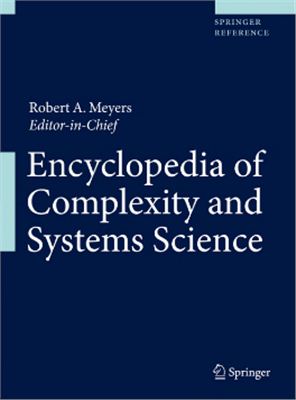SpringerScience+BuisinessMedia, 2009, Pages: 10370.
This encyclopedia provides an authoritative single source for understanding and applying the concepts of complexity theory together with the tools and measures for analyzing complex systems in all fields of science and engineering. It links fundamental concepts of mathematics and computational sciences to applications in the physical sciences, engineering, biomedicine, economics and the social sciences.
The complex systems mathematical and modeling tools and scientific and engineering applications that comprise the Encyclopedia of Complexity and Systems Science are as follows:
Agent Based Modeling and Simulation.
Applications of Physics and Mathematics to Social Science.
Cellular Automata, Mathematical Basis of.
Chaos and Complexity in Astrophysics.
Climate Modeling, GlobalWarming andWeather Prediction.
Complex Networks and Graph Theory.
Complexity and Nonlinearity in Autonomous Robotics.
Complexity in Computational Chemistry.
Complexity in Earthquakes, Tsunamis, and Volcanoes, and Forecasting and Early Waing of their Hazards.
Computational and Theoretical Nanoscience.
Control and Dynamical Systems.
Data Mining and Knowledge Discovery.
Ecological Complexity.
Ergodic Theory.
Finance and Econometrics.
Fractals and Multifractals.
Game Theory.
Granular Computing.
Intelligent Systems.
Nonlinear Ordinary Differential Equations and Dynamical Systems.
Nonlinear Partial Differential Equations.
Percolation.
Perturbation Theory.
Probability and Statistics in Complex Systems.
Quantum Information Science.
Social Network Analysis.
Soft Computing.
Solitons.
Statistical and Nonlinear Physics.
Synergetics.
System Dynamics.
Systems Biology.
TrafficManagement, Complex Dynamics of.
Unconventional Computing.
Wavelets.
This encyclopedia provides an authoritative single source for understanding and applying the concepts of complexity theory together with the tools and measures for analyzing complex systems in all fields of science and engineering. It links fundamental concepts of mathematics and computational sciences to applications in the physical sciences, engineering, biomedicine, economics and the social sciences.
The complex systems mathematical and modeling tools and scientific and engineering applications that comprise the Encyclopedia of Complexity and Systems Science are as follows:
Agent Based Modeling and Simulation.
Applications of Physics and Mathematics to Social Science.
Cellular Automata, Mathematical Basis of.
Chaos and Complexity in Astrophysics.
Climate Modeling, GlobalWarming andWeather Prediction.
Complex Networks and Graph Theory.
Complexity and Nonlinearity in Autonomous Robotics.
Complexity in Computational Chemistry.
Complexity in Earthquakes, Tsunamis, and Volcanoes, and Forecasting and Early Waing of their Hazards.
Computational and Theoretical Nanoscience.
Control and Dynamical Systems.
Data Mining and Knowledge Discovery.
Ecological Complexity.
Ergodic Theory.
Finance and Econometrics.
Fractals and Multifractals.
Game Theory.
Granular Computing.
Intelligent Systems.
Nonlinear Ordinary Differential Equations and Dynamical Systems.
Nonlinear Partial Differential Equations.
Percolation.
Perturbation Theory.
Probability and Statistics in Complex Systems.
Quantum Information Science.
Social Network Analysis.
Soft Computing.
Solitons.
Statistical and Nonlinear Physics.
Synergetics.
System Dynamics.
Systems Biology.
TrafficManagement, Complex Dynamics of.
Unconventional Computing.
Wavelets.

